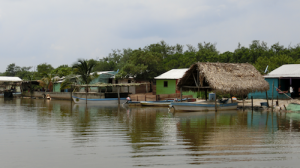V. Giannini, CMCC Foundation researcher at ECIP and RAAS Division, has received the Best Papers Award (3rd place) at the North American Symposium on Climate Change Adaptation that took place on August 16-18, 2016, in New York.
The paper, “A participatory process to design climate change adaptation measures for the Carmen-Pajonal-Machona lagoon system in Mexico” has been commended for its relevance, scientific adequacy and methodology.
The article was linked to TABASCO project focused on the Carmen-Pajonal-Machona lagoon system, a region located along the Gulf of Mexico in the State of Tabasco. It’s a low-depth (0.9 m on average) coastal wetland of about 190 km2, which is separated from the ocean by a fragile and highly vulnerable sand bar.
It has a high biological and ecological relevance: the area around the lagoons hosts important mangroves habitats, that have been highly impacted in the last decades, due to land-use changes (mainly into agriculture land and grassland for animal breeding), illegal cut for wood consumption, and erosion of the mangrove banks. The area hosts human communities strongly relying on the lagoon system services for their subsistence. The main productive activities are agriculture, livestock and, in areas closer to the lagoons, fisheries and aquaculture. The whole area is also characterised by the strong presence of oil extraction.
Climate change exacerbates the environmental and socio-economic problems of such a poor region changing precipitation patterns and increasing temperature, sea level rise, ocean acidification, extreme events (hurricanes, droughts) and coastal erosion.
The project aimed at assessing current and future vulnerability to human activities and climate change of the lagoon system and, consequently, identifying adaptation measures, which could be implemented and managed by the local communities living in the area around the lagoon.
The paper awarded was in particular focused on two workshops organized to elicit local knowledge on impacts and vulnerabilities while fostering community commitment through engagement.
The abstract of the paper:
The participatory process described is part of a project for the design of climate change adaptation measures to be implemented in the Carmen-Pajonal-Machona coastal lagoon socio-ecosystem, situated in the Mexican state of Tabasco. Since these measures should be implemented and managed by the local communities impacted by climate change, they were designed based on the active engagement of the local communities, international, national and local institutions, academics, i.e. on knowledge provided by local stakeholders. The project was organized around a set of different activities, a multidisciplinary effort drafted to create synergies among researchers of the Consortium. Two workshops were designed and organized as part of this. The first workshop’s (March 2015) aim was to elicit local knowledge on impacts and vulnerabilities, and ideas on what measures are needed to address them. Impacts and vulnerabilities identified in the first workshop and in the diagnostic were used to identify measures adequate to address climate and anthropogenic changes in the lagoon socio-ecosystem. The preliminary list of measures identified was refined through the second workshop (June 2015), in which participants provided qualitative information needed to identify the five most promising measures to address impacts using a multi-criteria decision support system: Mulino Decision Support System (mDSS).





